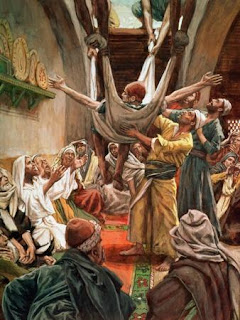Dedication of St. Michael the Archangel
In the name of the Father, and of the Son, and of the Holy Spirit. Amen. I tend to quote country songs a lot, and given that country songs have been described as “three chords and the truth,” it’s not surprising that they can draw one closer to God and His truth. One such song that connected with our celebration of St. Michael the Archangel today is by a country artist who recently gained Genesee County connections: Jelly Roll.
The song he sang is called “Liar” and to me it speaks about the voice of the one against whom St. Michael fights: the devil. Jelly Roll sings about how he let the devil “drive around my mind” and “played me like a fool.” Some of the lies that the devil tells are: “Drink another whiskey / Pop another pill / Money makes you happy / Heaven isn’t real / You won’t find nobody to love / Because your heart’s too broke.” But he recognizes those lines for the lies that they are, trying to keep him down in the suggestions in his head, in the dreams he has at night, promising to be his friend, but the devil’s just “blowin’ smoke” because he’s “nothing but a liar.”
 |
| Castel Sant'Angelo in Rome |
Why do we? We may not have perfect earthly happiness, or perfect communion with the natural world which gives us fruit without effort, but we have God Himself who enters into us! God not only walks with us in the cool of the evening, as He did with Adam and Eve, He humbles Himself to enter into us the Most Holy Eucharist, to fill us spiritually with His presence. And yet, how often do we turn away from God, disobey His commands, and listen to the lies that the devil feeds us?
Maybe it’s not excessive drinking, or drugs. Maybe it is for some of us. But I am willing to bet that each of us has had moments where money became our God and we thought if we just had enough of it we would be truly happy. Or maybe we doubted whether there’s anything beyond this world, if all the rules that we follow and the ascetical practices we do will amount to anything, or if death will be the end. Or maybe we have bought into the lie that no one could ever love us because we’re so broken that we’re not worthy of love.
When we have those lies in our head, we should turn to St. Michael the Archangel, or our guardian angel, or our patron saints and ask them to bring the light of Christ to cast out the darkness of temptation and sin. Pope St. Gregory the Great, while preaching a homily, said that St. Michael’s name in Hebrew means, “Who is like God,” and, “Whenever some act of wondrous power must be performed, Michael is sent, so that his action and his name may make it clear that no one can do what God does by his power.” Whereas Lucifer, the light bearer angel, sought in his pride to contend with God, St. Michael allows God to be God and work His power through whomever God chooses.
And that can be a lesson for us when fighting evil. From time to time, we might even be tempted to think that we are powerful enough to fight the devil and his fallen angels on our own terms. But that is pride, and leads to our downfall. Yes, we have a higher dignity than the angels, since Christ became man. But angels are more powerful than we are, and we should not seek to fight them on their own terms. Rather, rely on God’s helpers, whether angels or saints, and especially the Blessed Mother and St. Joseph, to allow God’s grace to cast down any evil spirits who seek the ruin of our souls. Follow the example of Michael and not try to grasp at power, but allow God’s power to work through them and through us.
There are many lies that the devil tries to get us to believe. Some of those lies we may have recognized in Jelly Roll’s song. Some of the lies the devil tells differ from those, but are no less powerful. But Christ is the Way, and the Truth, and the Life, and if we wish to come to the Father, we must hold fast to the truth, name the lie that the devil tells us as false, and run towards St. Michael and the saints to help us stay connected to the truth. May St. Michael and all the holy angels defend us always and keep us united to God–the Father, and the Son, and the Holy Spirit. Amen.








